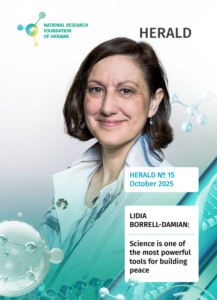 Since May 2022, the National Research Foundation of Ukraine has been a full member of Science Europe. Being a member of this Association is a great honor and a great responsibility for every participant.
Since May 2022, the National Research Foundation of Ukraine has been a full member of Science Europe. Being a member of this Association is a great honor and a great responsibility for every participant.
 We ask Secretary-General of Science Europe Lidia BORRELL-DAMIAN about the path the Foundation has followed during this time, the challenges and tasks confronting European researchers today, and how the Association has changed during the war.
We ask Secretary-General of Science Europe Lidia BORRELL-DAMIAN about the path the Foundation has followed during this time, the challenges and tasks confronting European researchers today, and how the Association has changed during the war.
–Dr. Borrell-Damian, you’re working as a Secretary General of Science Europe at an extremely responsible and critical time for Europe. On 24th of February in 2022, russia’s full-scale invasion of Ukraine began, and millions of Ukrainians (including researchers) fled abroad. In early March, Science Europe published an appeal to support Ukrainian researchers and Ukraine. How was it prepared? How did Science Europe and you personally act in the first weeks and months of the war?
–Thank you very much for this question and for proposing this interview for the Herald of the National Research Foundation of Ukraine.
Olga Polotska, Executive Director of the NRFU, contacted me in autumn of 2021 and expressed interest in the NRFU joining Science Europe. We exchanged several letters and had our first conversation in January 2022. When the war began, I contacted Olga Polotska and told her that the Science Europe Board of Directors was planning to make an official statement and asked her opinion on the matter. She replied: “Yes, that would be very good.”
We prepared a draft statement, consulted with the Board of Directors and high-level policy experts. People were only beginning to recover from the shock and assess the possible consequences.
On March 1, we published a statement in support of Ukraine, in which Science Europe and its member organizations condemned russian aggression and the occupation of Ukraine. We called on russia to cease hostilities and appealed to European countries to accept all those who had fled because of the war.
The Board of Directors also said: “The NRFU has expressed a desire to join Science Europe. Perhaps the Foundation would like to accelerate the process and become a member of the Association?”
The NRFU prepared an application for membership which was reviewed at the Association’s General Assembly in May 2022. The Foundation became a full member of Science Europe.

–Do you remember your thoughts in the first weeks of the full-scale invasion? Did you expect the war to drag on?
–Well, at that time, little did we know. I don’t know. I just started to support Olga Polotska the best way we could: by giving her our sympathies and by trying to include them as much as possible in the conversations of Science Europe.
No one realized how long this war would last. Everyone hoped it would be short…
It is worth remembering that at that time the world was only beginning to emerge from the COVID-19 pandemic. Meetings of the Global Research Council were still suspended. In 2022, we held the first in-person meeting after COVID in Panama. The Executive Director of the NRFU, Olga Polotska, was also invited to attend this meeting so that the Foundation could become part of the global community.
Everything went very well – Olga Polotska addressed the Global Research Council as well as the General Assembly of Science Europe in May.
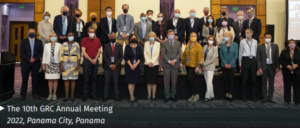
–You joined the Board of International Counselors of the NRFU in June 2022. At that time, funds of the NRFU were transferred to the country’s defense needs. What are your memories of that time? What tasks did you set for yourself?
–Of course we could only witness that with sadness. But at the same time, obviously, we understood that the government was very much in need of money for defense.
To simplify the situation, we waived the NRFU’s membership fee to Science Europe and covered the travel expenses of the Executive Director of the Foundation so that she could remain in contact with the international community.
Regarding the Board of International Counselors – it’s a very nice group and a very good experience. We hold meetings on a regular basis, and we had numerous discussions about how we could support the NRFU during the war. We also collaborate with International Science Council.
We organized several joint sessions together focusing more on rebuilding efforts after the war. The Executive Director of the NRFU also attended these meetings, and told about plans to modernize processes at the Foundation, about reform of the research review system, etc.
Science Europe and the Global Research Council have working groups that address these issues, so we drew on our existing work and helped integrate the NRFU into these processes.
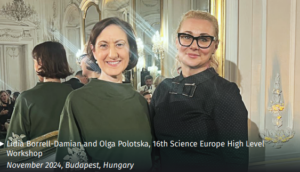
The high-level network in Science Europe gave Olga Polotska a very warm welcome. She provided us with detailed information about the damage the war had inflicted on research institutions and educational establishments.
Science Europe members in Estonia, Romania, and Poland were very active in assisting refugees, in particular by hosting researchers and their families.
–Being a member of Science Europe is both a great honor and a great responsibility for every participant of the Association. The political agenda of the European Research Area includes important issues such as expanding open access, promoting excellence, academic freedom, fair research assessment, and more. Looking back at the path the Foundation has taken, do you see any progress in these areas?
–Yes, absolutely. I think the NRFU has been truly analyzing and considering the policies of Science Europe regarding research funding and performing.
We have organized specific sessions for the NRFU experts on Open Science and research infrastructures.
The Foundation participates in special meetings of the ERA Forum, an expert group of the European Commission comprising representatives of EU member states, the European Commission, and stakeholders in the field of research and innovation. We ensure that participants in these meetings are aware of and consider the needs of Ukraine.
Together with the NRFU, we have done a lot to raise awareness of the consequences of the war, in particular the damage caused to research institutions and universities.
In addition, the Foundation has made significant progress in the field of Open Science. I can see that the NRFU staff are making considerable efforts to align the Foundation’s policies with those of other Science Europe members. Important study visits were carried out to Switzerland, Norway, the Netherlands, Germany. Many Science Europe members offered to host NRFU delegations, provide training, and help them understand how Open Science policies are implemented.
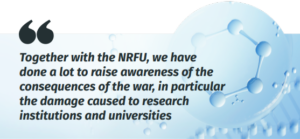
The NRFU is an active participant in Science Europe initiatives. The Foundation’s experts are involved in almost all working groups, listen attentively, make numerous suggestions, and are a pleasure to work with. We have also supported them in the process of integrating into the Horizon Europe program.
Therefore, I have great respect for the NRFU for its active work and willingness to adapt all these processes under the most challenging circumstances.
–The war has become a catalyst for the cooperation of Ukrainian researchers with the global research community. Many Ukrainian researchers are implementing joint projects with European counterparts and applying for Horizon Europe calls. Sometimes in Ukraine, we joke that Ukraine is on its way to the European Union, but our researchers are moving there a little faster. In your opinion, what is needed to make this cooperation even more active and our integration into the European Research Area faster?
–I believe that the rapid progress of our researchers is an excellent sign. It shows that, despite the war, connections are being actively established between researchers in Ukraine and Europe.
To ensure that not only individual researchers but also research institutions move faster, it may be worth accelerating the development and implementation of new policies in the areas of academic freedom, Open Science, gender equality, and others.
I realize that, for the government, this may seem risky: “Why rush? These policies have not been tested yet, and we are being urged to implement them immediately.” Such caution is entirely understandable and justified. However, it is important to find a balance – to implement new policies, especially those related to the Horizon Europe program, as quickly as possible while maintaining a measured approach.
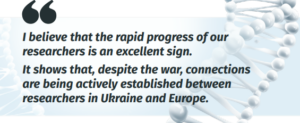
–Science communication plays a key role in the dialogue between researchers and society and is one of Science Europe’s priorities. While this field is well developed, researched, and taught at universities in Europe, it is still in its infancy in Ukraine, often thanks to the enthusiasm of specialists working on a voluntary basis. Based on your experience, what aspects of science communication do you consider most important to focus on at the early stages of its development?
–In March 2024, a major conference on science communication took place in Brussels, hosted by Science Europe in partnership with the Belgian Presidency of the Council of the EU. If I’m not mistaken, representatives from Ukraine also attended the event. One of the key conclusions of the conference was that science communication needs to be better integrated into research policies, especially at the stage of designing calls for proposals. The idea is that communication should be planned not after the project ends, but already during its development. In other words, calls should include clear requirements for science communication – and this is extremely important.
There are two main approaches to organizing science communication. For example, in France, there is a separate grant program for science communication. Its purpose is to support researchers who have achieved significant results and want to present them to a wider audience. This is a traditional approach.
The other, less traditional one involves integrating science communication directly into the terms and conditions of calls. Researchers are expected, already at the application stage, to specify tools for communicating both the results and the research process itself.
During the conference, participants agreed that for society to better understand science, it is necessary to talk about the entire research process, not only to present flashy results like ‘the new treatment for cancer’. Of course, such discoveries are easier to communicate because their impact is clear. However, there are other scientific achievements that result from long and complex research processes. These are harder to explain, and a wide audience is often unaware of them.

One of the key conclusions of the event was that researchers need to develop science communication skills and receive support for explaining the research process – its stages, methodology, and duration. It is important to convey to the public that research is often slow and sometimes even routine, but in the long run it leads to important results. The public usually does not realize these nuances; people just wait for the next big success story.

Research should not be limited to presenting achievements; it should explain how those achievements are reached. Moreover, it is necessary to talk not only about success but also about failure. Trust in research is based on understanding that researchers do not claim absolute truth, but rely on evidence, methodology, and integrity. This is what makes science communication difficult. This is the ‘grey area’ where researchers must explain that research is not about certainty, but about method and integrity.

That is why Science Europe has a working group on science communication which helps make complex research processes more understandable to the public.
–How has Science Europe changed since the start of russia’s full-scale invasion of Ukraine and, more broadly, against the backdrop of global changes? Have there been any changes in priorities, objectives, and values?
–Even before the war began Science Europe had already initiated a dialogue on values in research, which continued during the war. As a result, we came up with six main values: openness and transparency, integrity and ethics, equality, diversity and inclusion, collaboration, care and collegiality, autonomy and academic freedom. These values are essential and apply to all fields of research.
Our further activities we are building on these values, collecting examples from Science Europe members of how they integrated these principles into their institutional policies and strategies.
One thing is absolutely clear: cooperation is the heart of research activity. No research takes place in isolation – it requires interaction with colleagues who may be located anywhere in the world. Therefore, it is necessary to create more opportunities for cooperation. However, peace is vital for genuine cooperation. For countries at war, establishing partnerships is extremely difficult and often even impossible.
War leads to human losses and suffering, undermines science, and severs international ties, the restoration of which can take years or even decades. The destruction of international cooperation is, without exaggeration, a tragedy for science.
We cannot stop wars on our own, but the war in Ukraine, which is happening so close to us, on our doorstep, has deepened our understanding of values and reminded us why they are so important and worth fighting for.
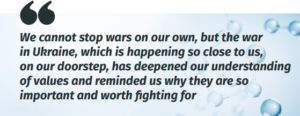
–In the appeal in support of Ukraine in 2022, Science Europe called on the international research community to review their official relations with russian research institutions and researchers. In your opinion, has everything possible been done in this direction? Has cooperation with russian researchers and institutions that directly or indirectly ‘work for the war’ been terminated? If not, what else needs to be done?
–Yes, in my view, all SE members have cut out ties with russian researchers.
Although this decision probably had unfair consequences for individual researchers who do not support this war, from an institutional point of view, everything possible was done. The European Commission excluded all russian organizations from the Horizon Europe program.
Sanctions against Russia are constantly being extended and tightened. As far as I know, cooperation with russian institutions has been completely suspended at the institutional level in Europe. No grants or funding are being provided to russian organizations, at least among the members of Science Europe.
–We have already spoken about changes in Science Europe and the NRFU. In your opinion, is the European research community ready for new challenges? In particular, have any instructions been given to researchers, institutions, or universities on how to act in case of security threats? Perhaps new support programs have been developed for researchers from different countries, not only from Ukraine, in case they need assistance.
–What I know is that, for individual cases, there is an organization called Researchers at Risk, which operates worldwide and is ready to support researchers who are personally persecuted or find themselves in difficult circumstances.
At Science Europe, we don’t work directly with individual researchers in such situations. Our focus is on the institutional level. In that regard, we now have a Task Force on Research Security, which addresses issues not only in the context of Ukraine, but more broadly.
Today, research security is a pressing issue for every country, particularly outside Europe. This year, we held a series of workshops on research security which served as a platform for Science Europe members to share their experiences. Participants shared information on how they respond to challenges, what measures they implement, and what approaches they use.
Currently we are summarizing the results of these events. The final document will reflect how Science Europe members approach research security, with the understanding that overly strict restrictions can hinder research progress. A standard approach is being developed that involves assessing the risks for each individual project: the institution receiving funding, together with the research team, must conduct a proper review, identify and minimize the risks of misuse of research results.
As far as I know, there are no large-scale support programs that directly address these risks yet. Instead, research funding organizations, research institutions, and national governments are developing a wider range of support policies. The main responsibility for implementing such approaches remains at the national level, where public authorities play a key role.
–In these challenging times, what continues to inspire personally you in your efforts to support international scientific cooperation and solidarity?
–For me, the main source of inspiration is the conviction that war needs to end. We work for science, we work for peace. This is not easy, as the war in Ukraine, the conflict in Gaza and other armed confrontations are contributing to the growth of defense budgets. Everyone says that the world needs peace, not war. But isn’t it somewhat contradictory to strive for peace while at the same time perfecting the means to destroy each other?
Of course, I understand the legitimate need to fund defense. At the same time, however, we must invest in peace through science. We need knowledge, dialogue, and mutual understanding. Science must help us find ways to build peace, not only to defend against war. We do not want to live in a world where war remains an acceptable way to resolve conflicts. Science and research must help us create more peaceful solutions.
Science is one of the most powerful tools for building peace. Through scientific cooperation and research, we can understand why humanity turns to wars and, more importantly, how to move toward peaceful ways of resolving conflicts and building society. This is possible. Science already crosses borders – social, economic, political. The concept of science diplomacy, which you have surely heard of, reflects one of the key qualities of science – its ability to unite through dialogue.

It is worth recalling that both Science Europe and the European University Association (EUA) were founded after World War II. At a time when the Iron Curtain divided Europe, universities and research councils deliberately decided to continue collaborating despite political differences. The first such associations appeared in the late 1940s and early 1950s. Researchers sometimes risked their lives to meet, often in neutral places such as Geneva.
These examples show how science can overcome divisions and foster mutual understanding. However, it is extremely difficult to maintain scientific cooperation during wartime. And while I may be oversimplifying a very complex issue, I still believe that the serious challenges facing humanity today can only be overcome together.
It is difficult, but we must try. This is what inspires me.
–What message would you like to leave for Ukrainian researchers who continue their work in Ukraine?
–Well, I can only say that I’m truly sorry.
I know there are many people across European universities doing their best to help and I would simply encourage everyone to make use of that support as best they can.
As for Science Europe, we are here to help, first and foremost through our member, the NRFU. And by supporting the NRFU, we hope to contribute to strengthening the entire research system in Ukraine.
So, my message is solidarity and encouragement: we are with you, and we will continue to stand by your side.

Interviewed by Svitlana GALATA
and Tetiana MACHULINA

